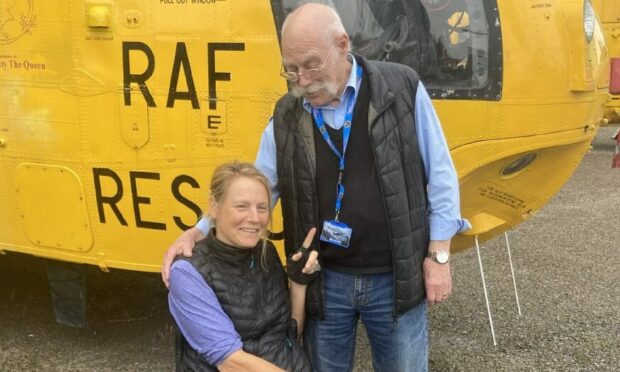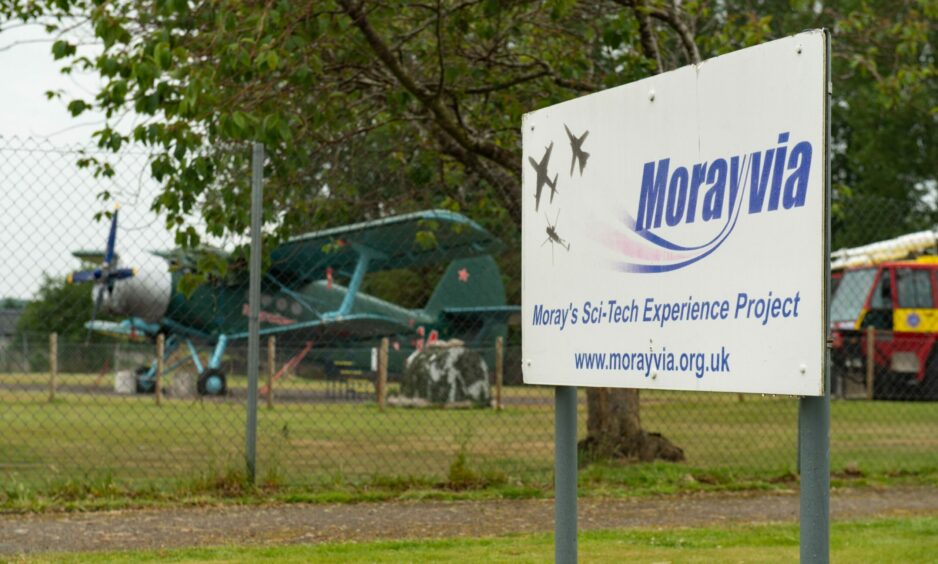Paul Challice’s new job had already got off to a memorable start when he met a gold medal-winning paralympian on his first day.
But what he discovered next left him lost for words.
A few minutes into the conversation with Karen Darke he realised their paths had crossed before and he had played a major role in her life.
The pair met while Karen and her nephews were visiting the Morayvia aviation museum in Kinloss.
That day, Paul – known as ‘Gramps’ – had just started as a volunteer.
As they chatted beside a Sea King search and rescue helicopter exhibit, Karen mentioned it was similar to the one that airlifted her to hospital following a major accident in 1993.
“I slowly put two and two together as I remembered the incident,” said Paul.
Life-changing accident
He realised he was a watch officer at Aberdeen Coastguard at the time when Karen fell while climbing cliffs at Cove in Aberdeen.
It was the accident that changed her life. A keen athlete and adventurer, she was left paralysed from the chest down aged 21.
But it was a call from Paul, who had previously served with the RAF for 30 years, which probably prevented even worse injuries. Ultimately, it helped Karen retain the use of her arms.
Both a lifeboat and inshore lifeboat had been sent to the scene of the accident. A rescue helicopter, scrambled from RAF Lossiemouth, was also on its way.
Karen had suffered a broken back and an unstable neck fracture.
Paul suggested waiting for the aircraft rather than risking further damage by being transferred from the smaller to the larger boat.
“They were going to take her off the rocks to the inshore lifeboat, transfer her 100 yards or so to the bigger lifeboat to get her to Aberdeen.
“They would then have to go up steps at the harbour and into an ambulance to get to hospital.
“Having considerable helicopter experience, I said the helicopter was only five minutes away and it has a specialist stretcher on board for back injuries.
“It made more sense to wait for a direct transfer to hospital rather than making several trips.
“Fortunately, they listened to the advice of a fairly new coastguard.
“If she had been jogged around she could have ended up completely paralysed rather than from the chest down.
“30 years later, I’m standing speaking to Karen. It was pure chance, such a coincidence.
‘Thank you for saving my arms’
“When she realised I was the one who suggested they wait for the helicopter rather than having several uncomfortable trips by lifeboat, she said ‘Thank you for saving my arms’.
“I didn’t know what so say. I’m not normally stuck for words, but that time I was. It was a lovely thing.”
Karen’s determination and passion for sport and the outdoors saw her go on to achieve remarkable feats of adventure.
In 1996 she hand-biked across the Himalayas from Kazakhstan into Pakistan. She would return in 2005 and 2018 to cross the Indian Himalayas.
In 2012 she won a silver medal at the London Paralympics the women’s road time trial. At 2016 in Rio, she won gold.
Last year she was honoured at the Fort William Mountain Festival for her “huge fighting spirit”.
Karen now splits her time between Inverness and Lossiemouth.
She said as she spoke with Paul, she realised that “something clicked” as he recalled the 1993 incident.
More coincidence was to follow when he introduced her to Bob Pountney, Morayvia’s director.
During his time in the RAF, Bob invented an adaptation to a stretcher for use in rescues of people with spinal injuries.
This was the type of stretcher used to help take Karen to hospital after her accident.
Paul served with the RAF from 1960-1990 before joining the coastguard.
He flew on many rescues with Bob, a former winchman whose missions included the Piper Alpha tragedy.
Karen described meeting the pair at Morayvia in a social media post under the headline “what a small world”.
‘Mind-blowing meeting’
Karen said on meeting both men: “It was mind-blowing to be honest, and pretty cool.”
She said of Paul’s decision to wait for the rescue helicopter: “He felt moving me to the lifeboat was a lot more risky.
“My back was broken and I am paralysed from there. But there is a good chance he saved further damage to my neck which would have meant I would not have use of my arms.
“I just said ‘thank you’ to them. Whatever they did has possibly given me my life and certainly my arms.”
The coincidences continued as, later that day, the friends who were with Karen at the time of her accident, also visited during a bike tour of Scotland.
“My nephews were just seeing all these dots joining up which was really interesting.”
Read about her backing to another Moray charity’s vision for Scotland’s first inclusive surfing facility.


